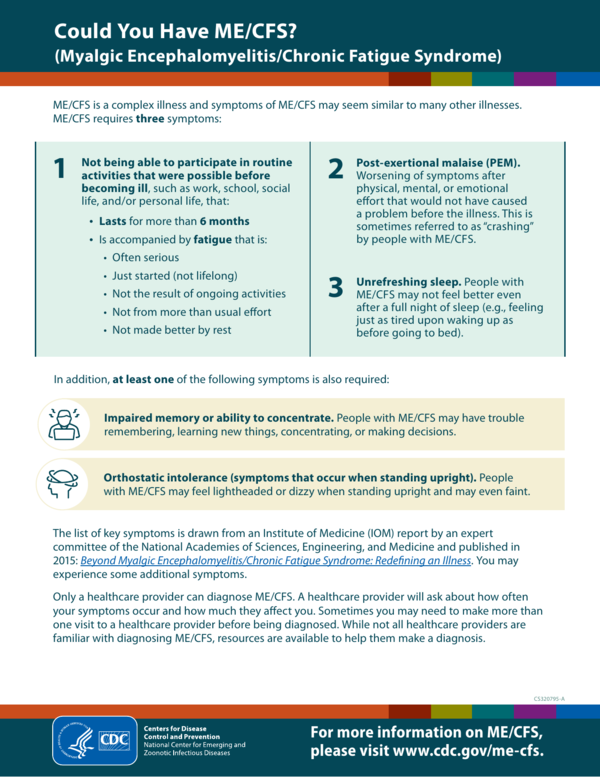Myalgic encephalomyelitis / chronic fatigue syndrome
Myalgic encephalomyelitis / chronic fatigue syndrome (ME/CFS) is a chronic medical condition characterised by severe, long-term fatigue, sleep disturbances, and cognitive difficulties. Often following an infection, it significantly impairs daily function and quality of life. The condition is more common in women and typically appears between the ages of 40 and 60, though it can affect younger populations as well.
Signs and Symptoms
ME/CFS features a range of debilitating symptoms. The hallmark symptom is post-exertional malaise (PEM), a worsening of symptoms following minor physical or mental activity. This can last from hours to months.
Debilitating Fatigue
People with ME/CFS experience persistent, overwhelming fatigue that does not improve with rest. This fatigue can lead to sudden muscle weakness, clumsiness, and mental exhaustion, making cognitive tasks difficult.
Sleep Problems
Unrefreshing sleep is another core symptom. People often wake up feeling exhausted despite a full night's sleep. They may experience insomnia, hypersomnia, or vivid nightmares.
Cognitive Dysfunction
Cognitive issues, often referred to as "brain fog," include difficulties with memory, concentration, and information processing. Individuals may struggle to find words, multitask, or recall recent events.
Orthostatic Intolerance
Orthostatic intolerance involves symptoms like nausea, dizziness, and cognitive impairment that worsen upon standing or sitting and improve when lying down. Some individuals may experience postural orthostatic tachycardia syndrome (POTS) or orthostatic hypotension.
Other Symptoms
Additional symptoms include pain, often without swelling or redness, gastrointestinal issues, sore lymph nodes, and sensitivities to light, noise, or chemicals.

Diagnosis
Diagnosis is based on symptoms, as no specific lab test is available. The process involves a thorough medical history, mental and physical examination, and blood and urine tests to exclude other conditions. Several diagnostic criteria exist, including the NICE guidelines, IOM criteria, and CDC criteria.

Pathophysiology
The exact cause of ME/CFS is unknown. However, it is associated with changes in the nervous and immune systems, as well as energy metabolism. Neurological differences include autonomic nervous system dysfunction and altered brain structure. Immunological changes often involve decreased natural killer cell function and, in some cases, autoimmunity.
Management
There is no approved cure or drug treatment for ME/CFS. Management focuses on symptom relief and may involve a multidisciplinary approach. Key strategies include:
- Pacing and Energy Management: Balancing activity with rest to avoid PEM. This may involve using heart rate monitors to stay within energy limits.
- Symptom Relief: Addressing sleep problems with good sleep hygiene and medications, managing pain with over-the-counter painkillers or specialist referral, and treating co-occurring conditions like irritable bowel syndrome or depression.
- Severe ME/CFS: Home adaptations and mobility aids can significantly improve quality of life for those with severe symptoms. Nutritional support may include intravenous or tube feeding.

Prognosis
Complete recovery is uncommon. Symptoms often fluctuate, and individuals may experience periods of improvement and relapse. Early diagnosis can improve care and prognosis, though many will need to adapt to living with the condition.
Epidemiology
Before the COVID-19 pandemic, ME/CFS affected roughly 0.17% to 0.89% of the population. Women are diagnosed more frequently than men, and the condition typically peaks at ages 10–19 and 30–39. Recent studies suggest an increase in cases due to long COVID.

History
ME/CFS has been recognised since the 1930s. It gained prominence after an outbreak at London's Royal Free Hospital in the 1950s. Despite early theories suggesting psychological causes, it is now generally considered a multisystem neuroimmune condition.

Society and Culture
ME/CFS is a contested illness with significant social and economic impacts. Patients often face stigma and disbelief, both socially and within healthcare settings. Advocacy groups work to raise awareness and improve research funding, which has historically been low.
Research
Research aims to better understand the disease, identify biomarkers, and develop effective treatments. The emergence of long COVID has sparked renewed interest, as it shares similarities with ME/CFS, potentially leading to breakthroughs in treatment and understanding.

Self-assessment MCQs (single best answer)
What is the hallmark symptom of ME/CFS?
Which age group is typically affected by ME/CFS?
What percentage of the population was affected by ME/CFS before the COVID-19 pandemic?
Which gender is more commonly diagnosed with ME/CFS?
What is a common method for managing energy in people with ME/CFS?
Which of the following is NOT a primary symptom of ME/CFS?
What is the primary cause of ME/CFS?
Which of the following conditions is commonly co-occurring with ME/CFS?
What historical event significantly raised awareness of ME/CFS?
What is a common misconception about ME/CFS?
Dentaljuce
Dentaljuce provides Enhanced Continuing Professional Development (CPD) with GDC-approved Certificates for dental professionals worldwide.
Founded in 2009 by the award-winning Masters team from the School of Dentistry at the University of Birmingham, Dentaljuce has established itself as the leading platform for online CPD.
With over 100 high-quality online courses available for a single annual membership fee, Dentaljuce offers comprehensive e-learning designed for busy dental professionals.
The courses cover a complete range of topics, from clinical skills to patient communication, and are suitable for dentists, nurses, hygienists, therapists, students, and practice managers.
Dentaljuce features Dr. Aiden, a dentally trained AI-powered personal tutor available 24/7 to assist with queries and provide guidance through complex topics, enhancing the learning experience.
Check out our range of courses, or sign up now!


